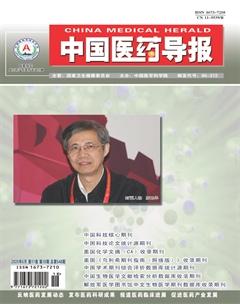外泌体与消化道肿瘤化疗耐药的研究进展
倪修凡 张尤历 徐岷
[摘要] 消化道肿瘤包括食管癌、胃癌、结直肠癌、肝癌、胰腺癌等,均具有较高的发病率和死亡率。目前,化疗是临床治疗消化道肿瘤的方法之一,但长期应用化疗药物常导致肿瘤细胞对化疗药物产生耐药性,是目前肿瘤治疗的重要挑战之一。外泌体是由双层膜构成的直径为30~100 nm的小囊泡,其内部包含蛋白质、核酸、脂质等。近年来发现其通过介导细胞间通讯、调节肿瘤微环境参与到肿瘤一系列发生发展中,尤其对于肿瘤的化疗耐药性具有重要影响。本文主要总结了国内外关于外泌体参与消化道肿瘤化疗耐药的研究,旨在更直观地阐述外泌体介导消化道肿瘤化疗耐药的机制,为肿瘤耐药的研究提供新思路。
[关键词] 外泌体;消化道肿瘤;化疗耐药;肿瘤微环境
[中图分类号] R735 [文献标识码] A [文章编号] 1673-7210(2020)06(c)-0049-04
[Abstract] The digestive system tumor including esophageal cancer, gastric cancer, colorectal cancer, liver cancer, pancreatic cancer, which have high morbidity and mortality. At present, chemotherapy is one of the treatments for digestive system tumors, but long-term application of chemotherapy drugs often causes drug resistance in tumor cells, which is one of the important challenge in tumor treatment. Exosomes are small vesicles with a diameter of 30-100 nm, which are composed of bilayer membrane. The exosomes contain proteins, nucleic acids, lipids, etc. In recent years, it has been found that exosomes participate in a series of tumor development and development by mediating intercellular communication and regulating tumor microenvironment, especially having an important impact on tumor chemotherapy resistance. This paper mainly summarized the domestic and foreign studies on the involvement of exosomes in the chemotherapy resistance of digestive system tumors, aiming to intuitively expound the mechanism of exosomes mediating the chemotherapy resistance of digestive system tumors, and provide new ideas for the study of tumor resistance.
[Key words] Exosome; Gastrointestinal tumors; Chemotherapeutic resistance; Tumor microenvironment
消化道肿瘤包括食管癌、胃癌、肝癌、结直肠癌、胰腺癌等,在肿瘤的致死组成中占1/4,其特点是发病率高、预后差[1]。化療目前是消化道肿瘤的一种重要治疗方式,尤其对于晚期患者,化疗效果与其预后密切相关,但患者往往会产生耐药性。而外泌体在化疗耐药的过程中发挥了重要的作用。
外泌体是直径在30~100 nm的小囊泡,起源于细胞内吞途径中的多泡体,通过胞膜内陷形成囊泡释放至细胞基质中[2]。其内包含核酸、脂质及蛋白质等多种成分,这些成分在外泌体磷脂双分子层包裹下有更强的稳定性,同时因其膜上的特异性蛋白,从而赋予传递信息物质的特异性[3]。外泌体参与了肿瘤发展的各个过程,尤其在肿瘤耐药性提升过程中,外泌体包裹的核酸、蛋白等物质起到了关键作用。故明确外泌体的作用方式及其介导的关键核酸、蛋白对探索肿瘤化疗耐药新方法具有重要的指导意义。
1 外泌体与消化道肿瘤
外泌体在消化道肿瘤进展中具有重要作用,参与调控肿瘤微环境、调节上皮-间充质转化(EMT)及提升肿瘤细胞耐药性等过程。Wang等[4]发现缺氧诱导的胰腺癌细胞通过外泌体传递miR-301a-3p激活PTEN/PI3Kγ通路诱导巨噬细胞的M2极化,进而促进胰腺癌细胞的增殖与迁移。结肠癌SW480细胞分泌的外泌体被HepG2细胞摄取后,促进信号调节激酶ERK1/2磷酸化,激活MAPK信号通路促进结肠癌细胞的转移[5]。此外,外泌体所包含的特异性蛋白及核酸作为肿瘤诊断标志物目前也有诸多报道。以下将对外泌体与消化道肿瘤化疗耐药的关系展开叙述,总结外泌体参与这一过程的主要方式及具体机制。
2 外泌体参与消化道肿瘤化疗耐药
近来发现外泌体对到消化道肿瘤化疗耐药这一过程具有重要影响。其主要通过两个方面参与肿瘤耐药:①耐药细胞通过外泌体赋予敏感细胞耐药性;②微环境中肿瘤相关基质细胞的外泌体参与调节肿瘤细胞耐药。下面,将对消化道各肿瘤化疗耐药展开详细的论述。
4 展望
隨着医疗技术的发展,消化道肿瘤在诊断、治疗方面已取得了长足的进步,但仍需进一步明确肿瘤的发生发展机制。化疗作为目前肿瘤治疗的关键点,需要找到肿瘤耐药的根源,更好地解决化疗耐药这一难题。外泌体作为重要的细胞间信息交流的媒介,在肿瘤耐药发生的过程中起到了关键作用,尽管尚未完全明确各肿瘤之间外泌体携带物的差异及明确机制,但外泌体在耐药中的研究已得到了初步揭示。在今后的研究中,明确各肿瘤化疗耐药过程中外泌体介导的具体分子变得尤其重要,可为靶向治疗及利用外泌体的新型治疗提供重要的理论依据。
[参考文献]
[1] Torre LA,Bray F,Siegel RL,et al. Global cancerstatistics,2012 [J]. CA Cancer J Clin,2015,65(2):87-108.
[2] Kalluri R. The biology and function of exosomes in cancer [J].J Clin Invest,2016,126(4):1208-1215.
[3] Raposo G,Stoorvogel W. Extracellular vesicles:exosomes,microvesicles,and friends [J]. J Cell Biol,2013,200(4):373-383.
[4] Wang X,Luo G,Zhang K,et al. Hypoxic tumor-derived exosomal miR-301a mediates M2 macrophage polarization via PTEN/PI3Kγ to promote pancreatic cancer metastasis [J]. Cancer Res,2018,78(16):4586-4598.
[5] Chiba M,Watanabe N,Watanabe M,et al. Exosomes derived from SW480 colorectal cancer cells promote cell migration in HepG2 hepatocellular cancer cells via the mitogen-activated protein kinase pathway [J]. Int J Oncol,2016,48(1):305-312.
[6] Zhang Y,Liu J,Zhang W,et al. Treatment of esophageal cancer with radiation therapy-a pan-Chinese survey of radiation oncologists [J]. Oncotarget,2017,8(21):34946-34953.
[7] Kang M,Ren M,Li Y,et al. Exosome-mediated transfer of lncRNA PART1 induces gefitinib resistance in esophageal squamous cell carcinoma via functioning as a competing endogenous RNA [J]. J Exp Clin Cancer Res,2018,37(1):171.
[8] Yang YC,Liu GJ,Yuan DF,et al. Influence of exosome-derived miR-21 on chemotherapy resistance of esophageal cancer [J]. Eur Rev Med Pharmacol Sci,2019,23(4):1513-1519.
[9] Li TT,Liu H,Yu J,et al. Prognostic and predictive blood biomarkers in gastric cancer and the potential application of circulating tumor cells [J]. World J Gastroenterol,2018, 24(21):2236-2246.
[10] Liu X,Lu Y,Xu YC,et al. Exosomal transfer of miR-501 confers doxorubicin resistance and tumorigenesis via targeting of BLID in gastric cancer [J]. Cancer Lett,2019, 459:122-134.
[11] Wang J,Lv B,Su Y,et al. Exosome-Mediated Transfer of lncRNA HOTTIP Promotes Cisplatin Resistance in Gastric Cancer Cells by Regulating HMGA1/miR-218 Axis [J]. Onco Targets Ther,2019,12:11325-11338.
[12] Zheng P,Chen L,Yuan X,et al. Exosomal transfer of tumor-associated macrophage-derived miR-21 confers cisplatin resistance in gastric cancer cells [J]. J Exp Clin Cancer Res,2017,36(1):53.
[13] Ji RB,Zhang B,Zhang X,et al. Exosomes derived from human mesenchymal stem cells confer drug resistance in gastric cancer [J]. Cell Cycle,2015,14(15):2473-2483.
[14] Fu X,Liu M,Qu S,et al. Exosomal microRNA-32-5p induces multidrug resistance in hepatocellular carcinoma via the PI3K/Akt pathway [J]. J Exp Clin Cancer Res,2018,37(1):52.
[15] Lou G,Song X,Yang F,et al. Exosomes derived from miR-122-modified adipose tissue-derived MSCs increase chemosensitivity of hepatocellular carcinoma [J]. J Hematol Oncol,2015,8:122.
[16] Takahashi K,Yan IK,Wood J,et al. Involvement of Extracellular Vesicle Long Noncoding RNA(linc-VLDLR)in Tumor Cell Responses to Chemotherapy [J]. Mol Cancer Res,2014,12(10):1377-1387.
[17] Takahashi K,Yan IK,Kogure T,et al. Extracellular vesicle-mediated transfer of long non-coding RNA ROR modulates chemosensitivity in human hepatocellular cancer [J]. FEBS Open Bio,2014,4:458-467.
[18] Ferlay J,Soerjomataram I,Dikshit R,et al. Cancer incidence and mortality worldwide:sources,methods and major patterns in GLOBOCAN 2012 [J]. Int J Cancer,2015, 136(5):E359-E386.
[19] Wang X,Zhang H,Yang H,et al. Exosome-delivered circRNA promotes glycolysis to induce chemoresistance through the miR-122-PKM2 axis in colorectal cancer [J]. Mol Oncol,2020,14(3):539-555.
[20] Hu JL,Wang W,Lan XL,et al. CAFs secreted exosomes promote metastasis and chemotherapy resistance by enhancing cell stemness and epithelial-mesenchymal transition in colorectal cancer [J]. Mol Cancer,2019,18(1):91.
[21] Hu YB,Yan C,Mu L,et al. Exosomal Wnt-induced dedifferentiation of colorectal cancer cells contributes to chemotherapy resistance [J]. Oncogene,2019,38(11):1951-1965.
[22] Ryan DP,Hong TS,Bardeesy N. Pancreatic adenocarcinoma [J]. N Engl J Med,2014,371(22):2140-2141.
[23] Mikamori M,Yamada D,Eguchi H,et al. MicroRNA-155 Controls Exosome Synthesis and Promotes Gemcitabine Resistance in Pancreatic Ductal Adenocarcinoma [J]. Sci Rep,2017,7:42339.
[24] Yang Z,Zhao N,Cui J,et al. Exosomes derived from cancer stem cells of gemcitabine-resistant pancreatic cancer cells enhance drug resistance by delivering miR-210 [J]. Cell Oncol(Dordr),2020,43(1):123-136.
[25] Binenbaum Y,Fridman E,Yaari Z,et al. Transfer of miRNA in macrophages-derived exosomes induces drug resistance of pancreatic adenocarcinoma [J]. Cancer Res,2018,78(18):5287-5299.
[26] Kamerkar S,Lebleu VS,Sugimoto H,et al. Exosomes facilitate therapeutic targeting of oncogenic KRAS in pancreatic cancer [J]. Nature,2017,546(7659):498-503.
[27] Ha D,Yang N,Nadithe V. Exosomes as therapeutic drug carriers and delivery vehicles across biological membranes:current perspectives and future challenges [J]. Acta Pharm Sin B,2016,6(4):287-296.
[28] Aung T,Chapuy B,Vogel D,et al. Exosomal evasion of humoral immunotherapy in aggressive B-cell lymphoma modulated by ATP-binding cassette transporter A3 [J]. Proc Natl Acad Sci U S A,2011,108(37):15336-15341.
[29] Zhang J,Zhang HD,Yao YF,et al. β-Elemene Reverses Chemoresistance of Breast Cancer Cells by Reducing Resistance Transmission via Exosomes [J]. Cell Physiol Biochem,2015,36(6):2274-2286.
[30] Wang X,Zhang H,Bai M,et al. Exosomes serve as nanoparticles to deliver anti-miR-214 to reverse chemoresistance to cisplatin in gastric cancer [J]. Mol Ther,2018,26(3):774-783.
[31] Liang G,Zhu Y,Ali DJ,et al. Engineered exosomes for targeted co-delivery of miR-21 inhibitor and chemotherapeutics to reverse drug resistance in colon cancer [J]. J Nanobiotechnology,2020,18(1):10.
(收稿日期:2020-02-14 本文編辑:刘明玉)
——外泌体与老年慢性疾病相关性的研究进展

